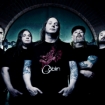Revolver has teamed with At the Gates for an exclusive "ultra clear" vinyl variant of their new album The Nightmare of Being. Quantities are extremely limited — order your copy now before they're gone!
Gothenburg melodeath pioneers At the Gates just dropped their new and seventh full-length album, The Nightmare of Being. It's the long-running Swedish group's most boundary-pushing outing yet: a death-metal powerhouse bursting with progressive musicianship and a reality-shaking lyrical concept about philosophical pessimism.
We recently caught up with frontman Tomas Lindberg Redant for a wide-ranging interview about his groundbreaking band's early days and legacy, the loss of good friends, embracing a "no-limits" mindset on The Nightmare of Being and much more.
Read the full feature in the new issue of Revolver, and check out 5 particularly interesting takeaways from the chat below.
1. Tomas Lindberg Redant identifies At the Gates more with "death metal" than the "Gothenburg sound"
"It's always a weird thing," said Lindberg Redant. "You'd probably get a similar answer from me that you would get from any member of any grunge band asking, What is grunge? An invented word — not by the musicians themselves. But I can't be too spiteful about it because in one way it helped spread the name a little bit with the scene. For us, we were always a death-metal band, first and foremost. The early death-metal scene was basically very young teenagers making a lot of noise and tape trading. Those days were amazing. But then when the second generation came here in Gothenburg bands, like Dark Tranquillity and In Flames … Of course we were influenced by each other … but not so much musically. More like the idea that you can explore and go further and do something else. But if you take those three bands they sound very different to each other."
2. Lindberg Redant and his late friend LG Petrov, of Entombed, bonded over their fear of flying
"First time I met LG must have been in 1986," he said. "Every time we went to Stockholm in the early days he would be there. Hanging out … there's a lot of fond memories. We were both very frightened of flying. [Laughs] So that was always the first thing: So how was your flight. Then we could joke and have a drink. He always had that smile and was very honest.
"People might see him as a loud frontman type of person, but he was a great listener. He will be very missed. Sometimes I forget that he's not there anymore. When I think about going to festivals here in Sweden I kind of picture him being there. But he won't. It's sad."
3. Like previous albums, At the Gates' new LP, The Nightmare of Being, was inspired by books
"It always starts with a book for me, doesn't it," he told us, laughing. "And I painted myself into a corner a little bit with the concept records since we came back with [2014's] At War With Reality. There's still [another concept] rumbling around my head that we might use next time. It hasn't matured yet …
"I read a lot of Thomas Ligotti before, but mostly his horror stories. But [At the Gates' guitarist] Martin [Larsson] kept nagging me, like, 'You have to read the Conspiracy Against the Human Race book [of non-fiction essays.] It's such an eye-opener to the world of pessimist philosophers.' I was like, Okay I'll give it a try. His writing is very captivating and makes a lot of [the concepts] make sense even if you're not a pessimist. There was a lot of purchases of online, from his liner notes — there are so many references — of books that we didn't have in stores here."
"I just felt that no one's ever done, that I know, a focused concept record about pessimism in the death-metal world," Lindberg Redant continued. "I wondered why. Is it too easy? Is it too obvious? [Laughs] Like, the suffering of the human soul, human consciousness as the evil that presses us down, the knowledge of death … There is a death-metal record there! [Laughs] … We wanted to describe the idea without preaching pessimism, cause that's not what we're doing. Then I got in contact with Eugene Thacker, the philosopher from the U.S., which spurred me on as well."
"It's me doing the vocals on [the collaborative song with Eugene Thacker] 'Cosmic Pessimism,' he added. "We agreed in the end that I would use some phrases that I really loved from Thacker's book called Cosmic Pessimism. I just loved some phrases, but it's like if you take those out and put them into lyrics how would you phrase that? So I presented it to him to see if that's the way to go and if it still makes sense to him as the author. That's how we worked with that song. So it was actually stuff that was written before, but used in the concept of the record."

4. He finds comfort in pessimism
"Pessimism is, weirdly enough, comforting," he revealed of embracing the philosophical concept to create The Nightmare of Being. "Of course I was wrapped up in a creative process that made me feel good. It's comforting to know that there are no disappointed pessimists. [Laughs] That's the optimistic, happy side of the record. As I've said jokingly, maybe I'm more of a realistic. But I learned over the pandemic to value the small things. Don't build too high goals so you're not disappointed. Of course you should still strive on trying to be creative and all that, but to hope for too much will always make you disappointed."
5. He's "cool" with Slaughter of the Soul's legacy — but he refuses to be constrained by it
"We owe a lot to that record and that part of our career," he said about At the Gates' game-changing 1995 album Slaughter of the Soul. "But we can also, as musicians and songwriters, see that as an isolated moment. That's what we sounded like then, that was our goal then: to make that precise aggressive piece of music. And now we're focused on this. And next time — cause we're always trying to be true to what we do at a certain time — that's exactly who we'll be then. I'm more cool with [Slaughter of the Soul] now. You can look at other bands … I hate comparing myself to other bigger bands, but to make the comparison: Slayer did two of their best records ever after Reign in Blood: South of Heaven and Seasons of the Abyss. Just go on and appreciate that people like you."








